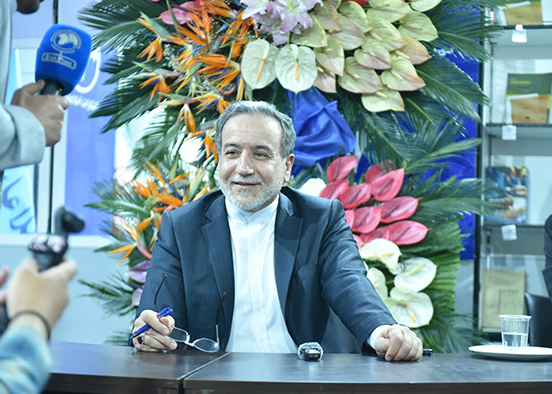
Araghchi: A Rich Culture and Civilization Is a Reliable Source of Power for Negotiators
2025-05-16 11:15
The Foreign Minister believes that negotiation is a game of talent, and relying on a rich culture and civilization provides negotiators with a dependable source of power.
According to the 36th Tehran International Book Fair News Headquarters, Seyed Abbas Araghchi, speaking at the Ministry of Foreign Affairs Publishing booth, told reporters:
“Although I currently don’t have time to read, I used to read many novels. My book ‘The Power of Negotiation’ is the result of 40 years of diplomatic experience, and I hope it will be useful for students.”
He explained that the book focuses on three pillars of negotiation:
1. Negotiation must be backed by the powers behind it.
2. The personal power of the negotiator is essential.
3. Negotiation itself generates power for the country.
He continued: “Every country has exceptional power in a certain field—be it scientific, cultural, or technological. A negotiator must be fully aware of their country’s strengths. Negotiation is a battlefield of talents. Often, when negotiators sit at the table, stylish photos are taken, but the real work begins afterward.”
Citing nuclear negotiations as an example, he said:
“Negotiation takes place when other options are either unfeasible or too costly. It is a give-and-take process—no one can expect to gain something in negotiations without giving something in return.”
Araghchi noted that concessions are not necessarily equal, and some countries might offer more than others.
“In the case of nuclear talks, whether with the P5+1 or the U.S., if they could have destroyed our nuclear facilities, they wouldn’t have come to the table.”
He emphasized: “Our power stems from the preparedness of our armed forces and missile capabilities. These are what deter military attacks. Likewise, if sanctions could have brought the Iranian people to their knees, there would have been no need for negotiations. If our nuclear scientists weren’t capable of advancing the program, there wouldn’t have been talks.”
He asserted: “A negotiator backed by a rich culture and ancient civilization is powerful. Add the negotiator’s own abilities to that, and it becomes an amplified strength.”
Referring to a chapter in his book on the Iranian style of negotiation, he said:
“Many Westerners compare the Iranian style of negotiation to traditional bazaar haggling—like how Iranian carpet sellers deal abroad—relentless bargaining until one side gives up.”
He shared a memory:
“My mother used to haggle a lot when we went to the Mashhad bazaar. No matter what the seller said, she kept negotiating. I once asked her, ‘What if the seller says the item is one qeran?’ She replied, ‘Then I’ll say give me two for a qeran.’”
He continued:
“Indirect negotiation is not unusual. Countries with deep conflicts use mediators to facilitate communication. Contemporary examples include Russia–Ukraine or Lebanon–Israel. However, indirect talks can be time-consuming and lead to misunderstandings. Sometimes, the intermediary may have their own agenda or seek credibility. So, you're never sure if your message is being conveyed accurately.”
The Battle of Narratives After Every Negotiation
Araghchi recalled: “One European intermediary during the JCPOA talks had a hearing problem, so we had to write everything down, which made the process harder.”
Regarding current U.S. negotiations, he said:
“An agreement is possible even through indirect talks. After each round of negotiations, every party tries to present their concessions as minimal and their gains as maximal—hence, a battle of narratives ensues.”
He added:
“These narratives aim to shape public and international opinion. In the past, we often faced the dominance of the enemy’s narrative. We hope media can support us in this area. Even though media doesn’t take orders, it needs to be informed.”
He noted:
“In ongoing negotiations with the U.S., including Washington and the President himself, we hear many contradictory statements. Is it due to a lack of coordination or a negotiation tactic? Our approach is to firmly stand by our fundamental principles. Defending the Iranian people’s rights is our position. There may be discussions on the nuclear program, but the right to enrichment belongs to the people, and we will not shut down any enrichment facility.”
He emphasized:
“Besides securing nuclear rights, our aim in negotiations is to lift sanctions. If the other side demands transparency, we are ready. We do not prohibit the presence of American companies. Beyond consumer goods, there is no ban on U.S. oil and gas companies operating in Iran.”
According to Araghchi, primary sanctions mean U.S. companies are banned from working with Iran. That was addressed in the JCPOA. However, secondary sanctions punish other countries for working with Iran.
He concluded: “We are seeking the removal of primary sanctions.”
The 36th Tehran International Book Fair started on May 6 and will continue until May 16, 2025, under the slogan “Let’s Read for Iran” at Imam Khomeini Mosalla. A virtual version of the fair is also running at book.icfi.ir for those who prefer online book shopping.



 Return
Return

